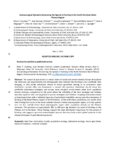Filters: Format: "application/pdf" School Or College: "College of Social & Behavioral Science" Collection: "ir_uspace"
1 - 25 of 12
| Creator | Title | Description | Subject | Date | ||
|---|---|---|---|---|---|---|
| 1 |
 |
O'Rourke, Dennis H. | Introduction: origins and settlement of the indigenous populations of the Aleutian Archipelago | The series of papers in this special issue of Human Biology use an interdisciplinary approach to address regional questions and to integrate disparate Aleutian data into a broad, synthetic effort. The contributors leverage decades of data on Aleut origins, biogeography, and behavior through integrat... | 2010 | |
| 2 |
 |
Codding, Brian F. | Environmental productivity predicts migration, demographic, and linguistic patterns in prehistoric California | Global patterns of ethnolinguistic diversity vary tremendously. Some regions show very little variation even across vast expanses, whereas others exhibit dense mosaics of different languages spoken alongside one another. Compared with the rest of Native North America, prehistoric California exemplif... | Colonization of North America; Prehistoric migrations; Human behavioral ecology; Ideal free distribution; Ideal despotic distribution | 2013-09-03 |
| 3 |
 |
O'Rourke, Dennis H. | Unangan past and present: the contrasts between observed and inferred histories | Abstract Academic research focusing on the population and culture history of the Aleut (Unangan) people began in the late 19th century and continues to the present. The papers in this special issue of Human Biology summarize the latest results from archaeological, linguistic, genetic, and morphometr... | 2010 | |
| 4 |
 |
McDaniel, Susan | Adoption policy in Great Britain and North America | This paper has two purposes. First, to explore what existing adoption legislation may indicate about the meaning and function of adoption practices in North America and Great Britain. Second, to consider some possible policy implications revealed by clearer understanding of the social meaning of exi... | Adoption law; Family; North America | 1984 |
| 5 |
 |
Cashdan, Elizabeth A. | Competition between foragers and food producers on the Botletli River, Botswana | The immigration of food-producing groups into areas occupied by hunters and gatherers must have been a common occurrence in prehistory. How were the hunter-gatherers affected by this? I describe here two groups of Kalahari Basarwa ('Bushmen'), one living along the flood plain of the lower Botletli ... | Kalahari Basarwa; Bushmen; Foraging; Cattle | 1986 |
| 6 |
 |
Fogel, Alan Dale | Maternal speech to three-month-old infants in the United States and Japan | An American-Japanese comparison of maternal speech to 3-month-old infants is presented. Mother-infant dyads were videotaped in the laboratory, and the maternal speech was analysed by function and syntactic form. US mothers were more information-oriented than were Japanese mothers; they also used mor... | Maternal speech; Information-oriented; Affect-oriented; Prelinguistic infants; Baby talk | 1990 |
| 7 |
 |
Hawkes, Kristen | Binumarien color categories | This paper has two aims. The first is to describe an ethnographically new system of color classification, Binumarien, a non-Austronesian or Papuan language of the Eastern Central Highlands of New Guinea2. In this connection we are particularly interested in relating our data to the Berlin and Kay (1... | Binumarien; Binumariens | 1975 |
| 8 |
 |
Holzner, Claudio A.; Jameson, Kenneth P.; Maloney, Thomas N.; Abebe, Berhanie; Lund, Matthew; Schaub, Kristen | Economic impact of the Mexico-Utah relationship | This study began during the Summer of 2005 and set out to examine the complexity of the globalized relation between Utah and Mexico, concentrating on broadly defined "economic linkages." It was designed to build upon earlier similar studies done in Arizona and in Texas on those states' relations wit... | Economics, Utah; Migration; Immigration; Mexico; Undocumented immigrants | 2006-03-10 |
| 9 |
 |
Fogel, Alan Dale | Developing through relationships origins of communication, self, and culture | I began to consider the study of relationships as an intellectual vocation in 1970, the result of two years of college teaching that was part of my work as a United States Peace Corps volunteer in Bogota, Colombia. After another year I began my doctoral training in the Department of Education at th... | 1993 | |
| 10 |
 |
Codding, Brian F. | Socioecological dynamics structuring the spread of farming in the North American Basin-Plateau Region | The spread of agriculture is a major driver of social and environmental change throughout 25 the Holocene, yet experimental and ethnographic data indicate that farming is less profitable than foraging, so why would individuals choose to adopt agriculture leading to its expansion? Ideal distribution ... | Ideal free distribution model; population ecology; behavioral ecology; maize agriculture; Ancestral Puebloan; Fremont Complex | 2021 |
| 11 |
 |
Wiessner, Pauline W. | On emergency decisions, egalitarianism, and group selection | Boehm (CA 37:763-93) puts forward an important thesis-that with the evolution of egalitarian societies, privileged routes to reproductive advantage are blocked and the power of individua selection severely compromised. With competition so constrained, altruistic behavior can more readily spread i... | Boehm's mode; Evolution of altruistic behavior | 1998-06 |
| 12 |
 |
Wiessner, Pauline W. | Vines of complexity - egalitarian structures and the institutionalization of inequality among the Enga | The initial stages of the institutionalization of hierarchical social inequalities remain poorly understood. Recent models have added important perspectives to "adaptationist" approaches by centering on the agency of "aggrandizers" who alter egalitarian institutions to suit their own ends through de... | Egalitarian structures; Political evolution; Social d | 2002-04 |
1 - 25 of 12
